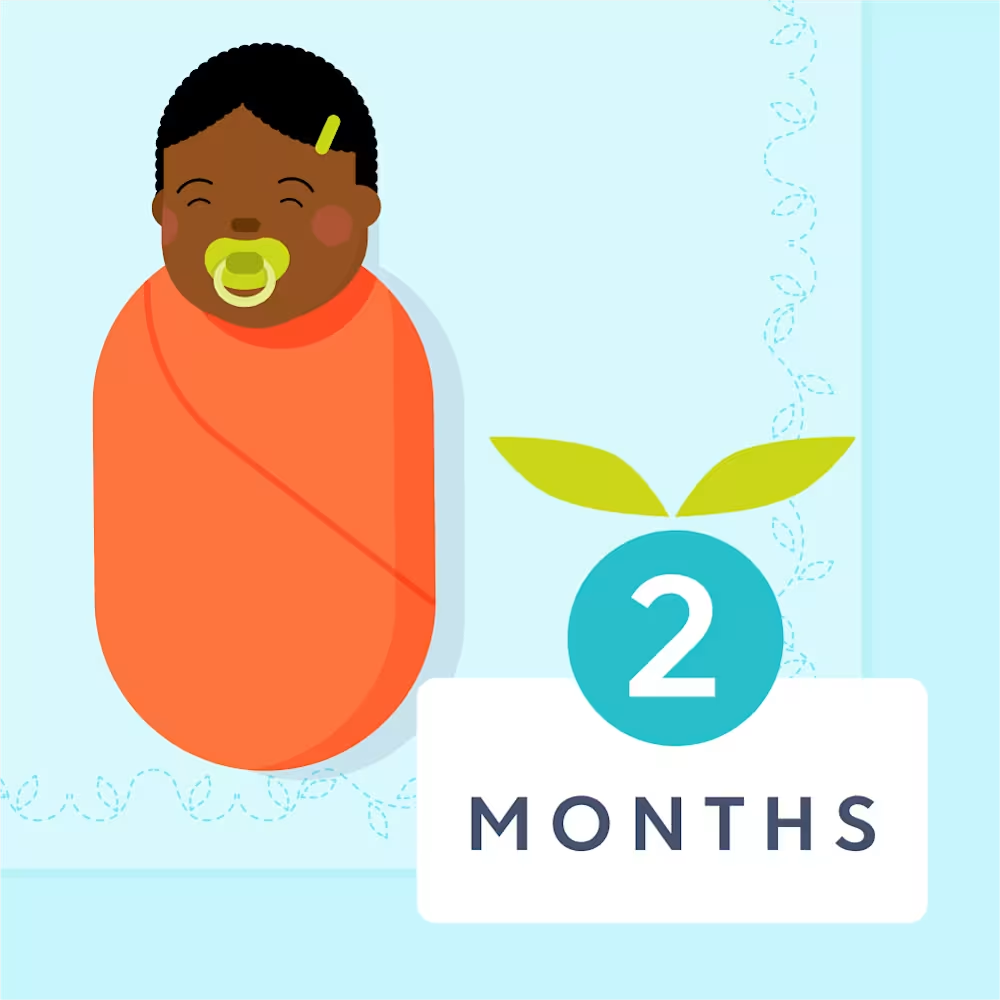Newborn feeding schedule (From birth to 2 weeks): Amounts & food chart
Updated Jan 02, 2026

When you bring your new baby home, there are lots of changes to adjust to, and it can be a bit overwhelming. One important thing to know is that the feeding schedule for a newborn can change quite a bit and will likely take some time to settle into a consistent pattern — that's normal!
In this article, we'll walk you through typical newborn eating schedules, give you tips for ensuring your baby is getting the nutrients they need, and answer frequently asked questions about newborn feeding by week.
Newborn to 2 weeks old baby sample feeding schedule
In the first two weeks, it's common for babies to engage in cluster feeding, which means they might nurse frequently and take in small amounts of milk each time. Feedings may last between 15 - 60 minutes. This can even happen during the night, with feedings often occurring every two hours. According to the American Academy of Pediatrics (AAP) [], cluster feeds and frequent feedings can actually boost the health of your infant.
The recommended feeding schedule for a newborn is usually every 2 - 3 hours. That means you'll be a pro at feeding your little bundle of joy about 8 - 12 times a day. Your baby won’t figure out this whole "sleeping through the night" thing until they’re older, so those nighttime feedings are totally on the menu. You can think of it as your little one's way of saying, "Hey, I need some midnight snacks too!"
In these early days, it’s not just about how often your baby feeds — it’s also about how long they’re going between feeds. If your newborn hasn’t woken up on their own within about 3 hours, it’s time to gently wake them and offer a feeding. Yes, even if they look peaceful and cozy! Their tiny tummies empty quickly, and you want to make sure they are gaining adequate weight as they adjust to life outside the womb.
(Many physicians look for babies to be back to birth weight by the end of 2 weeks.) For breastfeeding families, this will also help increase and manage milk supply.
Remember, every baby is different, and it's normal for the feeding schedule to change frequently during this early stage. With time, you'll become more familiar with your baby's needs and develop a routine that works best for both of you.
How to know if a newborn is hungry
The AAP recommends [] feeding your newborn baby on demand. This means feeding your baby when you see signs of hunger rather than following a structured scheduled, such as:
Fists moving to mouth
Head turning to look for the breast
Becoming more alert and active
Sucking on hands or lip smacking
Opening and closing mouth
How much to feed from birth to 2 weeks old: feeding chart
The majority of newborns feed every 2 - 3 hours, totaling 8 - 12 feedings within a 24-hour period. Initially, newborns might consume as little as half an ounce per feeding (both formula [] and breastfed infants) during the first day or two after birth.
After this initial period:
Newborns typically consume 1 - 2 ounces of milk at each feeding (both formula and breastfed infants)
By the time they reach 2 weeks of age [], the quantity usually increases to 2 - 3 ounces per feeding.
Keep in mind that newborn feeding amounts may be hard to gauge, especially for babies who nurse at the breast. If you have concerns about your newborn's eating schedule or worry that they're not consuming enough, check in with their pediatrician or a lactation consultant.
How often to feed a baby from birth to 2 weeks old
In the first two weeks of life, your baby’s feeding needs are unpredictable and persistent. While this can feel overwhelming, these early feeds are vital for your baby’s development. Learning to follow your baby’s hunger cues (and letting go of the idea of a rigid schedule) can help you both settle into a rhythm that feels more manageable over time.
How you choose to feed your baby, whether it's through nursing or formula, might influence the feeding schedule and amounts later on, but in the first few weeks, the differences are minimal. Here’s a general idea of what to expect.
Typical breastfeeding patterns
Breastfeed your newborn to 2 week old baby when they show signs of hunger — typically 8 - 12 times during a 24 hour period. Note that breastfed babies typically need smaller, more frequent feedings than their formula-fed counterparts.

Typical bottle-feeding patterns
As a general guideline, it is recommended that your baby consumes approximately 2.5 ounces (75 mL) of infant formula per pound (453 g) of body weight on an average day. This may look like 1.5 - 3 oz for each feeding, 8 feeds per 24 hr period.

Other liquids
Infants in this age range should not have other liquids or any foods.
Newborn feeding challenges
Feeding a brand new baby can feel like trying to crack a secret code in those hazy first two weeks. One minute they’re snoozing through feeds, the next they’re nursing every 20 minutes like they’re training for a summer festival’s eating competition. Maybe your newborn latches like a champ one minute or acts like the bottle is an insult the next. Maybe they scream like the burp cloth personally wronged them or they nod off two sips in.
It’s a lot, and you’re not doing anything wrong. These early days are full of trial and error (and snacks — you need snacks, too). Every feed is a tiny step toward figuring each other out.
6 tips for feeding your newborn to 2 weeks old baby
Feeding a brand-new baby can feel like equal parts instinct and mystery. In the first two weeks, you're getting to know your baby’s cues, building your milk supply (if nursing), figuring out bottles (if not), and navigating zombie hour wakeups — all while healing from birth (if you gave birth), adjusting to a brand-new caregiving role (if you didn’t), and running on very little sleep either way. Phew that’s a lot!
Whether you’re breastfeeding, formula feeding, combo feeding, or still figuring it out, these six tips will help you feel a little more grounded as you learn what works best for your family.
Tip #1: Expect round-the-clock feedings
Get ready to join the "every 2 - 3 hour club." When you look at newborn feeding week by week, you'll quickly see that very young babies eat frequently day and night in order to grow and thrive.
Tip #2: Breast milk supply adjusts according to demand
If you're nursing or using a pump, expressing milk can help build your milk supply. If there are concerns with milk supply, it may be helpful to pump after each feed to help boost milk production. On the other hand, watch for engorgement at this stage — pumping may exacerbate engorgement and can lead to mastitis and breast abscess. This can be a tricky balance. If in doubt, reach out to a lactation consultant for guidance (and reassurance!).
Tip #3: Brace yourself for some cluster feeding action
Your little bundle of joy might surprise you with a series of shorter feeds, one after another. Don't panic, it's totally normal! Think of it as a baby buffet, where they're getting all the goodies they need to grow and thrive.
Tip #4: Stay hydrated
Make sure to keep your own water within reach when you sit down for a feeding session. And if you are breastfeeding, don't forget to stay hydrated like a pro athlete. Guzzle that water to keep that breast milk flowing.
Tip #5: Feed yourself
Let's not forget about the superhero in this story — you! You need all the energy and health you can get to keep up with your amazing caregiving skills. So, chow down on frequent meals and choose healthy foods whenever possible.
Keep snacks nearby that you can eat with one hand: granola bars, string cheese, as well as precut fruit and veggies.
Tip #6: Count wet diapers
It’s normal to worry about whether your baby is getting enough to eat. Typically, once your baby reaches the age of 5 days or older, you should observe a higher frequency of wet diapers, usually totaling six or more within a 24-hour period. Check with your medical provider if you’re seeing fewer wet diapers or have concerns that your baby isn’t getting enough to eat.
Night feeding from birth to 2 weeks old
Your little one will wake up frequently during the night in these initial weeks. Newborns have tiny stomachs (think: the size of a cherry) and fast metabolisms, which means they need to feed every 2 – 3 hours around the clock []. Even if they’re sleepy, most babies need to be gently woken for feeds during these early days to make sure they’re getting enough nourishment and to help establish feeding patterns (especially for breastfeeding parents working on milk supply).
If you’re the non-birthing partner or support person, you play a huge role here too. Whether it’s doing a bottle feed, burping the baby, handling diaper changes, or just being the steady hands during a 3 a.m. cry session, your presence matters. Creating a rhythm together can turn night feeds from overwhelming to manageable. Here are some ways you can be involved while the world around you snoozes:
Swapping shifts on who is awake with baby
Burping baby after a feed
Changing a diaper before or after a feed
Prepping bottles ahead of time
Washing pump parts
Offering a glass of water
Speaking words of appreciation
What to feed a newborn baby
In the first two weeks of life, newborns only need one thing for nutrition and hydration: breast milk or infant formula. These two options provide the perfect balance of calories, nutrients, and fluids to support your baby’s rapid growth and development. At this age, babies shouldn’t be given water, juice, or any other liquids — even in small amounts. Their kidneys are still developing, and introducing anything other than breast milk or formula can be dangerous, even if it’s well-intentioned [].
Takeaway: feeding from birth to 2 weeks old
From birth up to 2 weeks old, babies will eat frequently, gradually increasing their intake. Although feeding patterns will change as they grow, during this early stage, most babies need breast milk or formula every 2 - 3 hours, even at night.
Some newborns may engage in cluster feeding, which means they have shorter and more frequent feedings. This is completely normal and can actually help stimulate your milk supply if you're breastfeeding. Formula-fed babies will also require frequent feedings, including during the nighttime. Following your baby’s hunger cues is key.
Trial-and-error is a part of the feeding journey at this age. If you experience any discomfort while breastfeeding, it's essential to reach out to your medical provider or a lactation consultant for guidance and support.
Remember, every baby is unique and their feeding needs may vary. You’re learning just as much as your baby is. You're doing an amazing job, and with time, you'll become more familiar with your baby's feeding patterns.
Share article:
Note: The content on this site is for informational purposes only and should not replace medical advice from your doctor, pediatrician, or medical professional. If you have questions or concerns, you should contact a medical professional.
6 Sources
Share article:







